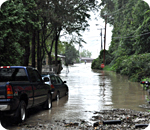
Individual preparedness, not Big Government 'management,' would have helped those most in Sandy's path
Wednesday, October 31, 2012 by: J. D. Heyes
Tags: preparedness, superstorm Sandy, Big Government
- Newly released JFK files reveal Pentagon's role in creating Lyme disease and covid in the same lab
- Dr. Suzanne Humphries makes bombshell appearance on Joe Rogan podcast, exposing vaccine industry deception back to POLIOMYELITIS
- L.A.'s rebuilding nightmare: Only 4 permits issued after fire destroys 6,000 homes
- Discovery of vast underground city beneath Giza pyramids challenges human history
- Black cumin seed oil emerges as a powerful ally against breast cancer and chronic inflammation
- Catastrophic 7.7 earthquake devastates Myanmar and Thailand; death toll could reach 100,000
- The hidden battle in your glass: How A1 and A2 milk could shape your health
- AI breakthrough slashes celiac disease diagnosis time from months to minutes
- Sugar-free deception: Artificial sweeteners hijack hunger signals, fuel obesity epidemic, study warns
- Europe braces for WAR as EU urges citizens to STOCKPILE FOOD, in latest provocations with Russia
- Kiss Your Genetic Privacy Good-Bye! 23andMe Gets Green Light to Sell Your Intimate Genetic Details to Anyone They Want
- Putin vows to 'finish off' Ukraine, accuses West of prolonging the war
- Thomas Massie’s Dual Loyalty Disclosure Act aims to restore American sovereignty by cracking down on foreign influence in Congress
- Aluminum pollution: A silent threat to human health
- Tesla owners under siege: Road rage, vandalism and political backlash fuel fear among drivers nationwide
- Chaos in Amsterdam: Five injured in broad daylight knife attack near Dam Square
- "Feel G.O.O.D. Gut Health Program" on BrightU: Dr. Basima Williams introduces the Feel-Good Plate Method
- Trump's 25% auto tariffs: A bold move to strengthen U.S. manufacturing despite short-term challenges
- Newly released JFK files reveal Pentagon's role in creating Lyme disease and covid in the same lab
- Analysis: The coming economic collapse, a mass uprising and Trump's three secret weapons to halt the growing revolt
- Trump nominates VACCINE ZEALOT Susan Monarez to lead the CDC, sidelining RFK Jr.'s reform efforts
- Trump's greatest betrayal so far: Accelerating Middle East wars, silencing dissent, and serving Zionist masters
- Dr. Mike Yeadon releases 15-minute testimony - WATCH - about genocidal intent of COVID “vaccines”
- Festive flavors: The sweet history, nutritional profile and health benefits of pecan pie
- Elon Musk: Aliens could be here on Earth RIGHT NOW
- Big Pharma's $8 Billion bribery scheme exposed: how doctors are pushed to prescribe junk science, not heal
- 5 Simple steps to boost your brainpower: How to strengthen executive function in a distracted world
- Trump reverses course on Gaza plan, says “nobody is expelling Palestinians”
- A lack of integrity in Academia: Harvard professor found GUILTY of fraudulent research to promote CRT theory
- Reclaim your health: How midlife exercise reverses years of inactivity
- Survival 101: Effective EMF blocking techniques
- Florida takes a stand: DeSantis proposes permanent ban on mRNA vaccine mandates
- Sugarcane extract superior to cholesterol-lowering drugs?
- California's social media censorship law struck down: A victory for free speech or a threat to online safety?
- OpenAI whistleblower who dissented against how the company trained ChatGPT found dead
- EPA advisor admits the agency is funneling billions to climate groups ahead of Trump’s return to White House
- EPA advisor admits the agency is funneling billions to climate groups ahead of Trump’s return to White House
- Newly released JFK files reveal Pentagon's role in creating Lyme disease and covid in the same lab
- California's social media censorship law struck down: A victory for free speech or a threat to online safety?
- Dr. Mike Yeadon releases 15-minute testimony - WATCH - about genocidal intent of COVID “vaccines”
- The Health Ranger releases “Vaccine Zombie” song and music video, using AI-animated zombies for the music video
- The pandemic as a tool for INDOCTRINATION: Understanding “The Indoctrinated Brain” by Dr. Michael Nehls
- Florida takes a stand: DeSantis proposes permanent ban on mRNA vaccine mandates
- “Why we influenced the 2020 elections”: Facebook files reveal the coordinated effort to bury the Hunter Biden laptop story
- Mike Adams releases country western hit single: Goin’ Back in Time is Comin’ Home
- Mike Adams releases music poetry sensation: A Child of God
- Unpacking the Lies That We’ve Been Fed – new song and music video released by Mike Adams, the Health Ranger
- Michigan sheriff announces criminal investigation into 2020 election crimes, Dominion Voting Systems
- Migrants are taking advantage of recent hurricanes to scam residents and loot their homes
- House Intelligence Committee calls for the ARREST and PROSECUTION of Dr. Anthony Fauci
- RFK Jr. clears key hurdle: Sen. Susan Collins backs controversial HHS nominee, signaling a new era for health policy
- Rep. Nancy Mace introduces bill to ban biological males from female facilities on federal property
- Peter Rost exposes Big Pharma corruption in his book “The Whistleblower: Confessions of a Healthcare Hitman”
- Mike Adams releases new song and music video: Nothing More Disgusting Than a Globalist
- Red Cross issues warning to stop blood plasma donations from vaccinated people
- Scientists confirm: GENIUS brain function can be spontaneously unleashed in humans without any apparent cause
- EPA advisor admits the agency is funneling billions to climate groups ahead of Trump’s return to White House
- HYSSOP: What research reveals about the health benefits of this ancient holy herb
- Two containers with completed ballots fall out of truck in Florida
- Fully vaccinated about to see “tsunami” of illness and death, warns virologist
- Global leaders unite to clamp down on “misinformation” with UN-backed Cascais Declaration
- BREAKING: 2025 NDAA authorizes mandatory military draft of WOMEN across America… as Pentagon pursues global NUCLEAR war with both Russia and China at the same time
- Michael Yon warns of a ZIONIST TAKEOVER in Trump’s second administration
- BOMBSHELL: DNA testing kits are a SCAM to develop ethnic-specific bioweapons
- Ozempic and Wegovy weight loss drugs are injectable LIZARD VENOM PEPTIDES that may unleash a devastating wave of organ failure… side effects align with symptoms of SNAKE BITES
- Israeli soldiers accused of even more torture and abuse in the West Bank
- These 13 countries just signed an agreement to engineer a global FAMINE by destroying food supply
- NASA admits that climate change occurs because of changes in Earth’s solar orbit, and NOT because of SUVs and fossil fuels
- RFK Jr. clears key hurdle: Sen. Susan Collins backs controversial HHS nominee, signaling a new era for health policy
- Sermon 30: How Jesus reveals Caesar’s FAKE CURRENCY and FALSE AUTHORITY
- Coriander seeds: Ancient medicine backed by modern science
- Arizona officials claim Maricopa County needs 10-13 days to tabulate results of the election
If by that headline you deduced that the Times' editors were stumping for a Big Brother (read federal government) response to Hurricane Sandy, you'd be right. But then, that's a common reaction to any incident that you believe is too big for you and that scares you to death; when you're conditioned to die, you look for someone else to come bail you out, to come save you, to rescue you from a situation for which you are wholly unprepared.
On its surface, the Times op-ed masqueraded as a hit piece aimed at GOP presidential contender Mitt Romney, bashing him for earlier comments in which he said he, as president, would seek to downplay the federal government's disaster response role in favor of states and local jurisdictions taking the lead.
"Absolutely," Romney said in response to a question during a Republican primary earlier this year, in which he was asked if emergency management was a function that should be returned to states. "Every time you have an occasion to take something from the federal government and send it back to the states, that's the right direction. And if you can go even further and send it back to the private sector, that's even better."
No preparedness mindset
That response, given the circumstances of the current "frankenstorm" encircling The Big Apple, rankled the Times' editors.
"Disaster coordination is one of the most vital functions of 'big government,'" they intoned, before describing Romney's position on the matter "an absurd notion."
"Those in Hurricane Sandy's path are fortunate that, for now, that ideology has not replaced sound policy," said the editorial, which hailed the Federal Emergency Management Agency as the end-all, be-all of disaster management (at least under Democratic regimes).
"Fortunate?" "Sound policy?" FEMA?
Surely the Times' editors jest, right? FEMA?
No, they're very serious. And very frightened.
What is evident to me, besides the superficial, anticipated and wholly stereotypical attack on all things Republican, is that the Times' editors, and the urbanized audience they are playing to, are trying to hide a desperate, deep-seated fear that someone, someday, may actually force them to have to rely on themselves in times of dire need.
Helpless, vulnerable and weak
Never mind that Romney has actually been a governor and knows what federal policies and programs both help and hinder state governments. His message was simply this: Not every good solution comes from the labyrinth maze of centralized bureaucracy in Washington, D.C. He was saying those closest to the problem - states and localities - are better suited to handle their own business in times of trouble, not some detached bureaucrat in some remote office at some bloated bureaucracy hundreds or thousands of miles away.
This isn't - nor should it be - about politics; state disaster agencies can also be bloated, dismissive and unresponsive. This should be about how unprepared too many Americans are in this day and age of the Nanny State, and how come too many "influential" institutions in our country seem to want to perpetuate that mindset, while demonizing anyone who dares to suggest that individuals are responsible for themselves, not government.
Prior to Sandy's landfall, people were warned to get out, to get prepared. But many didn't; now millions are without power and lacking in basic services. Why didn't they just leave?
Because they don't know how to take charge of their own situation. They don't know how to take care of themselves; they are so used to having others "take care" of them. They figured, no matter what, someone would be along presently to provide necessities.
Newspapers like The New York Times act as enablers for this kind of dependency mindset, and in the end, that makes us a weaker nation, a weaker society.
Conditioned to die
In Missouri and other states across the Midwest, a U.S. Northern Command-sponsored exercise known as "Vigilant Guard" will begin the first weekend in November. The focus of the exercise is preparing for and responding to an earthquake originating from the New Madrid Fault located in southeast Missouri.
Agencies involved include the National Guard, FEMA, state emergency management agencies and other "first responders," including local and state police, firefighters and medical personnel.
The catastrophic nature of such an event cannot even be predicted, but some analysts believe if it ever happens, it could push the region all the way back to the Stone Age, in terms of destruction.
Highways will be fractured and unusable. Bridges will collapse, along with cell phone towers. Entire towns could be wiped out. Flooding is likely from the nearby Missouri and Mississippi Rivers.
Residents of the state and surrounding regions could be without services and effective modes of travel not for days or weeks, but for months. What will they do? How will they feed themselves? Where will they find enough water to drink? How quickly will "help" arrive? Will help arrive?
If The New York Times gets its way, these people - like tens of millions more Americans conditioned to "wait for help" in the face of societal breakdown - will not survive.
The best defense against dependency and control by others is to learn how to be independent - before disaster strikes. Have supplies. Have a plan of action. Have an escape hatch.
Do it now, and don't let people like the editors at The New York Times talk you into becoming just another victim waiting for some bureaucrat to bail you out.
Sources:
http://www.nytimes.com
http://www.dnr.mo.gov/geology/geosrv/geores/techbulletin1.htm
http://www.moguard.com
http://www.reuters.com
Preparedness at FETCH.news
Get independent news alerts on natural cures, food lab tests, cannabis medicine, science, robotics, drones, privacy and more.
More news on preparedness
Take Action: Support Natural News by linking to this article from your website
Permalink to this article:
Embed article link: (copy HTML code below):
Reprinting this article:
Non-commercial use OK, cite NaturalNews.com with clickable link.
Follow Natural News on Facebook, Twitter, Google Plus, and Pinterest
Science News & Studies
Medicine News and Information
Food News & Studies
Health News & Studies
Herbs News & Information
Pollution News & Studies
Cancer News & Studies
Climate News & Studies
Survival News & Information
Gear News & Information
News covering technology, stocks, hackers, and more



"Big Tech and mainstream media are constantly trying to silence the independent voices that dare to bring you the truth about toxic food ingredients, dangerous medications and the failed, fraudulent science of the profit-driven medical establishment.
Email is one of the best ways to make sure you stay informed, without the censorship of the tech giants (Google, Apple, Facebook, Twitter, YouTube, etc.). Stay informed and you'll even likely learn information that may help save your own life."
–The Health Ranger, Mike Adams













































